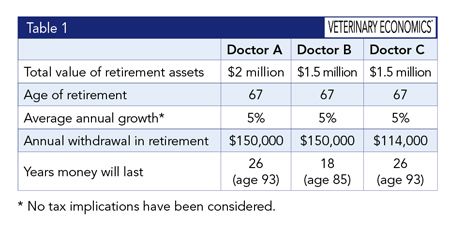How the recession has affected practice owner retirements
One veterinarian retires in flush times, and two need to wrestle with the recession. See where they end up with different choices.
Veterinarians A, B, and C are all retiring at age 67, but check out how a drop in asset value affects them. Doctor A is in the ideal scenario, beginning retirement with $2 million in assets and withdrawing $150,000 per year to cover forecasted living expenses. Funds will last 26 years, until the ex-veterinarian reaches the ripe old age of 93.
Things aren't so good for Doctors B and C—who are experiencing what many veterinarians in the past few years have had to cope with. With the loss of half a million in assets, Doctors B and C have made tough choices. Doctor B could opt to keep his yearly withdrawals at $150,000 but for only 18 years, making it to age 85 in financial solvency. Doctor C could cut his yearly withdrawals by almost 25 percent to keep them coming to age 93.

Tom McFerson, CPA, ABV, is a partner with Gatto McFerson CPAs in Santa Monica, Calif. The firm has appraised veterinary practices and assisted veterinarians with practice purchases for more than 20 years. Send questions or comments to ve@advanstar.com.